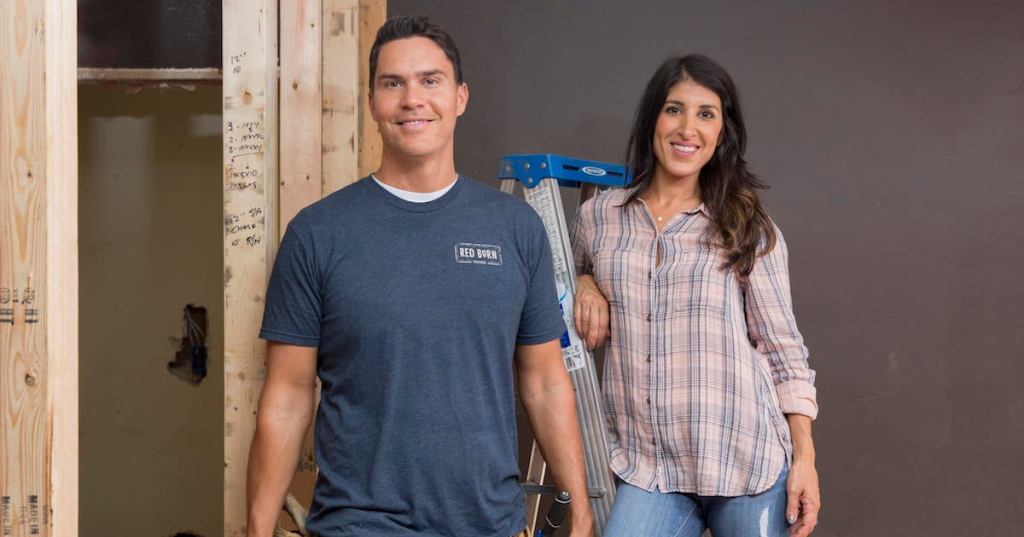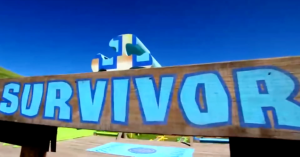Ken and Anita Corsini are back! The Flip or Flop Atlanta stars have a new reality competition series on HGTV: Flipping Showdown. The show, which premieres on Wednesday, Nov. 17, the Red Barn Homes, LLC owners will give renovators and flippers the opportunity to win a $100,000 cash prize, as well as the chance to start and grow their own real estate/flipping franchise.
During the six-episode series, the Corsini’s will invest more than $2 million of their own money, which provides the nine homes required for the series and the necessary budgets for each renovation challenge. This is a bold new outing for the flipping experts, who have bought, sold and renovated over 800 homes since starting one of the top-rated real estate businesses in Atlanta. Pop Culture spoke with the Corsinis about the new show, what they looked for in competitors, transitioning from full-time gigs to becoming business owners, and whether they enjoyed Flip or Flop Atlanta more than Flipping Showdown.
Videos by PopCulture.com
PC: I’m really excited about this show because we’re so used to seeing real estate shows, but this one has a twist. This time around you guys are giving other people opportunities to start their own businesses. Why go this route instead of doing the typical home renovation show and make it a competition?
KC: There’s definitely a lot of renovation in this show. There’s three different teams. They all picked up with their families to Atlanta for a number of months while we filmed. Each of the teams flipped three houses. So there were a total of nine houses that end up getting flipped or renovated on the show. I think what made it more fun and more interesting was this competition element that we haven’t had in a show before where you put these teams in a pressure cooker and see how they respond. Within each other, there’s a good amount of drama and there’s some amazing before and afters. They were all three very talented teams. For us, it was sort of fun to be on a different side of the equation where, instead of us being in the middle, flipping the houses, it was almost like a job interview. We were watching these other people flip our houses and renovate the houses and have to perform. It was fun. It was a lot of fun.
AC: It was also a great opportunity to come alongside some flippers and help them and mentor in a sense. We wore a lot of hats in this. Obviously, we were very invested financially and in our business. We were handing over our homes that we were planning to flip for this and really working alongside these flippers as they essentially interview for a Red Barn franchise, which is… our hope is that they would all become successful in their home environments, their hometowns, so flip to them. I think that’s part of the why. We want to share what we’ve learned. We’ve learned a lot. We’ve found secret sauce in the deal.
KC: It was an opportunity for us to expand our brand and our vision for our business. It was fun to see three different teams vying for that position. It almost felt like The Apprentice a little bit.
What were you guys looking for in terms of choosing a winner? Obviously, each team would bring something different. So what were the factors or the special recipe that you were looking for to make the decision on who you would ultimately select?
AC: That is a really good question because so many of the shows that have been competition shows on the network have been mostly judged on adding value to the home, where that is just one of the criteria that we were looking for. Because adding value to a home matters, but also how you add value, how you work with your crews, what the design is at the home. Did you over renovate the home? Did you under renovate the home? Did you do your homework before you got started? All of those things were criteria that we were looking for. If you boiled it down to the three things that we really looked at, it was-
KC: How much value was added to the property. Because each of the houses were very different from each other. So it wasn’t like there was a lot of uniformity. Everybody had a very different house. So how much value did you add at the end of the project? Obviously we wanted to see how they managed a renovation. How did you manage your crews? How did you manage your budget? And then we were looking for brand ambassadors. How did you treat people? How did you execute your designs? Did you get along with the crews? How did you respond under pressure?
AC: Did you do what you said you were going to do? Just because you make a plan doesn’t mean you act on the plan.
KC: Can you stick to the plan? Can you stick to a budget?
AC: Right. Can you scale back your plan when you realize your budget’s not going to hold it or are you going to put your heels in, dig your heels in and think you’re right? How well are you going to receive criticism or how well are you going to receive feedback on a design? All of that’s really important because, if you’re going to give away a piece of a franchise or your name and your brand, whoever you’re working with has to be-
KC: A good representative-
AC: Yeah. And teachable. And flexible. So there’s an element there that’s probably inherent in that, but that’s definitely what we’re looking for.
We know you guys from Flip or Flop this show has such a different spin to it. For you guys, what has been more rewarding and why? Or maybe if you guys love them equally, you can explain why, Flip or Flop or Flipping Showdown?
AC: Oh gosh, that’s a loaded question. This is a totally different, totally different format. So what’s funny, it’s like the silly Ken and Anita from Flip or Flop turn into the… You get to see my teacher side in this show of where I… You’re handing over your homes and your resources to strangers, essentially, that are flipping your houses for you. We were much more of, at least I should speak for myself…
KC: We probably, we feel more like business owners in this than just house flippers. Where, in the previous show, you see Ken and Anita flipping, flipping house, now I think you’re going to see… Our business has really grown dramatically even since Flip or Flop aired and now we probably are portrayed more as business owners, managing three different sets of teams and probably come across a little bit more seasoned, a little bit more like mentors. In terms of your question, I really, really enjoyed this Flipping Showdown. To wear a different hat and be more on the mentor side of things and to see these really, really talented teams come in and vie for a position at Red Barn, it was really rewarding. Very, very different experiences. It’s hard to compare the two.
AC: Yeah, because they were so different. A lot of the contestants really welcomed feedback and they really wanted that. I think, even more than winning, that’s what they wanted. They wanted to know how to be better at what they do and what skill sets do they need to add. I have many conversations, on and off camera. “Does it make sense for you to get your real estate license? Does it not? Does it make sense for you to do more design? Does it not?” Those kind of things. That’s super rewarding, to be able to shepherd others in the business. Flip or Flop was really fun too. It was a totally different animal. For me, it was really fun to showcase design and specifically design for flip, but this was different. I wasn’t really wearing my designer hat in this show. It was more of guiding design for flip. So it’s just very different opportunities.
KC: It was very rewarding to get to know these three teams on a personal level. I can’t say enough about how awesome these three teams were, personally and professionally. We’re still in regular contact with all of them, even though the show’s finished filming. We’ve built really good relationships with and will continue to stay in touch with them. That, for us, was a cherry on top, that we got to build these relationships.
Anita, I read that you were actually a math teacher prior to you guys’ business. Then, when Ken started his real estate business, you jumped ship and he asked you to get your real estate license, from what I understand. What made you feel confident enough to take that risk? Because a lot of people want to be entrepreneurs but obviously there are so many risk factors that could be taken into account.
AC: Yes. Part of it, part of what motivated me was I wanted to be able to be more available to our family. Because at the time I was expecting our first child. I know myself as an educator and as someone who works, I’m all in. When I was teaching, I was so invested in my students, in my work that that would’ve been very difficult to have children at home and be that invested, working. I think really and truly, more than a love for real estate then was the motivation of, “I can still help support this new venture that Ken is on and I can also be available to our family.” So it just made sense at the time.
Not to say that it wasn’t a sacrifice, because it was. It was a sacrifice and there was a definite transition for me because I love teaching and I love mathematics and I love all those things. But I will say this. After doing it and after, like you said, jumping ship, being all in into my family, now that my children are older, I’m even more all in to the business. Nothing was wasted. Everything that I used in my education career has been, all those skills have carried through. I’m actually very, very grateful for my life journey and my life story, because I think everything kind of plays into each other.
Obviously, you work together. You guys have said previously that your kids are naturally a part of the family business, but what do you guys get as far as the enjoyment of working together?
KC: It’s funny. I have this conversation with my kids regularly because there were so many, so many parents are commuting back and forth to work and they’re earning a living in a corporate job. We have, we’re blessed. We have the benefit of being home and working from home and working around our kids.
AC: Or bringing them along with us.
KC: Bringing along with us. For us, it’s a little bit of a lifestyle business where we are together a lot more than I think a lot of families. We sort of did that by design. We have actually multiple offices around Woodstock, Georgia, and we still work out of our house because, for us, it’s still more important to be with each other, investing in our family, investing in our kids. If the kids decide down the road that they want to be full-time involved in the business, that would just be the fantastic. But obviously we want to support them in whatever their, wherever their dreams and endeavors take them.
A lot of people say to be careful with mixing business with marriage, but it works for you guys. Obviously, a lot of these shows are married couples thriving in business, but how do you guys keep your marriage and your business thriving equally? What do you think is the secret to that?
AC: I think respecting one another, honestly, is really the secret to that. Because I have such a high regard for Ken and his skillset and what he brings to the business and to our family. And I really think that, if you can respect one another and have some humility that you’re really, you’re unstoppable at that point.
KC: We also respect each other’s strengths and, to that end, we sort of stay in our own lane. I know what I’m good at and I know what I’m not good at. And so does she. Luckily, she gravitates to the design and more of the traditional real estate things and she’s a people person so she’s fantastic working with other agents and working with people. Where I’m probably a little bit more on the business side of things and-
AC: The visionary.
KC: Yeah, visionary. And the financing and the larger direction of things. So we sort of stay out of each other’s way. At the same time we can both be contributing to the business. Honestly, we sort of circle up maybe once or twice throughout the day. “Where are you at? Where are you at? That’s great.” And we trust each other that we’re going to keep moving the business forward. In our respective ways.
For people who weren’t selected to be a part of this inaugural season of the show, there are so many viewers watching who may already be in the business or those who may want to get into the business of real estate in whatever regards, whether that’s buying or selling or flipping homes, what is your advice to those who are interested in going down this path?
KC: It’s funny. When we got started back in 2005, there were not nearly as many resources available in people as there are now. There are a lot of resources out there in terms of helping people learn the business, educate themselves and figure out what part of the business they want to plug themselves into. I wrote a book last year that came out called Profit Like the Pros that specifically was geared towards people who were interested in the industry or might already be in the history and just covered a lot of different facets of the business. Because there’s a lot of different ways people can plug in and carve out a model for themselves. And we’ve written numerous blogs over the years as well. There’s, like I said, there’s a lot of great websites, a lot of resources where people can educate themselves even before deciding where and how to jump into the business.
AC: But I would definitely say, you’re going to try to do this, do not start it blindly. Do your research, find a mentor, partner with someone else who knows what they’re doing, you know.
KC: Educate yourself.
AC: Educate yourself. One of the hardest tasks is finding the right house. If you just buy a house and say, “I’m going to flip it”, you-
KC: You set yourself up.
AC: You could really set yourself up for a lot of heartache if it’s not the right house for the right price and the right… There’s a lot of behind-the-scenes that go into it. And then the design plan and all… There’s a lot to it that people need to take into consideration before they just go, “Hey, I’m going to buy this house and I’m going to flip it and sell it.” There’s a little more to it than that.









